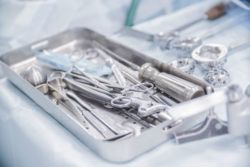Top Class Actions’s website and social media posts use affiliate links. If you make a purchase using such links, we may receive a commission, but it will not result in any additional charges to you. Please review our Affiliate Link Disclosure for more information.

According to the U.S. Food and Drug Administration (FDA), the mesh is most often intended to be implanted permanently in order to provide additional support to a weak vaginal wall in the case of POP repair or support the urethra and lower part of the bladder for SUI repair.
As indicated by the FDA, there are two main types of surgical mesh used in these procedures—mesh made from sterilized cow or pig tissue that is absorbable, and mesh made from man-made materials which are non-absorbable.
Absorbable mesh is not intended to be removed, but it is not permanent either. The body will eventually break down the mesh but purportedly not before new tissue growth has been stimulated to support the repaired area. Non-absorbable mesh is not intended to be removed either, but will not break down and is meant to provide permanent support to an area.
What is POP?
Among transvaginal mesh uses is the repair of pelvic organ prolapse. According to the U.S. Department of Health and Human Services Office on Women’s Health, pelvic organ prolapse occurs when the pelvic organs—which include the uterus, bladder, and rectum—cease to be adequately supported by the muscles and tendons in the area.
When these muscles and tendons become weakened, at least one—if not more—of these organs can drop or prolapse into the vagina.
The Office on Women’s Health indicates that there are three different types of this phenomenon—a dropped bladder in which it falls partially into the vagina, a rectocele in which the rectum bulges into the vagina, and a dropped uterus in which it prolapses into the vagina.
What is SUI?
According to the Mayo Clinic, stress urinary incontinence. or SUI, occurs is when voluntary and involuntary muscle movement such as jogging or a sudden sneeze causes unintentional loss of bladder control. SUI is not based on any psychological condition as the term ‘stress’ in the title actually refers to pressure.
Transvaginal mesh uses for POP repair have been called into question by the FDA. A little over two years ago, the FDA reclassified surgical mesh for POP repair from a medium-risk to high-risk category.
Complications from this specific surgery have included infection, mesh organ perforation, inordinate bleeding, painful intercourse, and urinary system malfunctions. Follow-up research has indicated that people suffering from these complications have had to have second surgeries to remove the mesh.
While such complications are not unheard of in SUI treatment with mesh, the Mayo Clinic suggests that this happens on a much less frequent basis and the situations are less complicated to treat.
If you or a loved one has experienced complications from the treatment of POP or SUI with transvaginal mesh, a consultation with a knowledgeable products liability attorney may help get you the compensation you need to cover for lost wages while you have sought additional treatment and for medical bills.
Do YOU have a legal claim? Fill out the form on this page now for a free, immediate, and confidential case evaluation. The transvaginal mesh attorneys who work with Top Class Actions will contact you if you qualify to let you know if an individual lawsuit or class action lawsuit is best for you. [In general, transvaginal mesh lawsuits are filed individually by each plaintiff and are not class actions.] Hurry — statutes of limitations may apply.
ATTORNEY ADVERTISING
Top Class Actions is a Proud Member of the American Bar Association
LEGAL INFORMATION IS NOT LEGAL ADVICE
Top Class Actions Legal Statement
©2008 – 2024 Top Class Actions® LLC
Various Trademarks held by their respective owners
This website is not intended for viewing or usage by European Union citizens.
Get Help – It’s Free
Join a Free Transvaginal Mesh Class Action Lawsuit Investigation
If you or a loved one were injured by a transvaginal mesh product and underwent revision surgery to remove the mesh or repair the damage, you may have a legal claim. Submit your information now for a free case evaluation.
An attorney will contact you if you qualify to discuss the details of your potential case at no charge to you.
Please Note: If you want to participate in this investigation, it is imperative that you reply to the law firm if they call or email you. Failing to do so may result in you not getting signed up as a client, if you qualify, or getting you dropped as a client.












